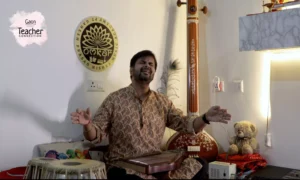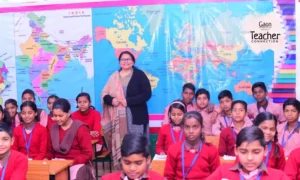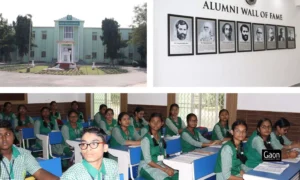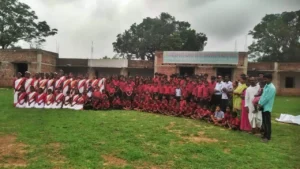Gupta Majhi was in class eight at the Dhungiaput Upper Primary School, when the COVID lockdown happened in March 2020. His father, who worked as a labourer in the neighbouring state of Andhra Pradesh, returned to Dhungiaput village in Malkangiri in Odisha. There was no work at the village and the family from the Dora community was cash-strapped.
In order to help out, Gupta who was 13 years old then, became an agricultural labourer to support his family of six. Two years later, when his school reopened in February, 2022, he was in no mood to resume his studies.
“I was not interested in going to school as I needed to earn to support my family. I had even migrated to Andhra Pradesh in search of work after the lockdown norms were relaxed,” 15-year-old Gupta, told Gaon Connection.
But the teenager is now back to school and has resumed his education. Like him, several other village children who had dropped out of school during the pandemic, are now pursuing their studies. All thanks to Geeta Pradhani, a gaon mitra in the community learning centre in Dhungiaput village.
A year ago, 15 learning centres were set up in 45 villages that came under the Mathili block of Malkangiri. They were set up in June 2022 with the support of project Samadhan of the Centre for Youth and Social Development (CYSD), a non-profit that works for social and educational upliftment of backward communities in Odisha.
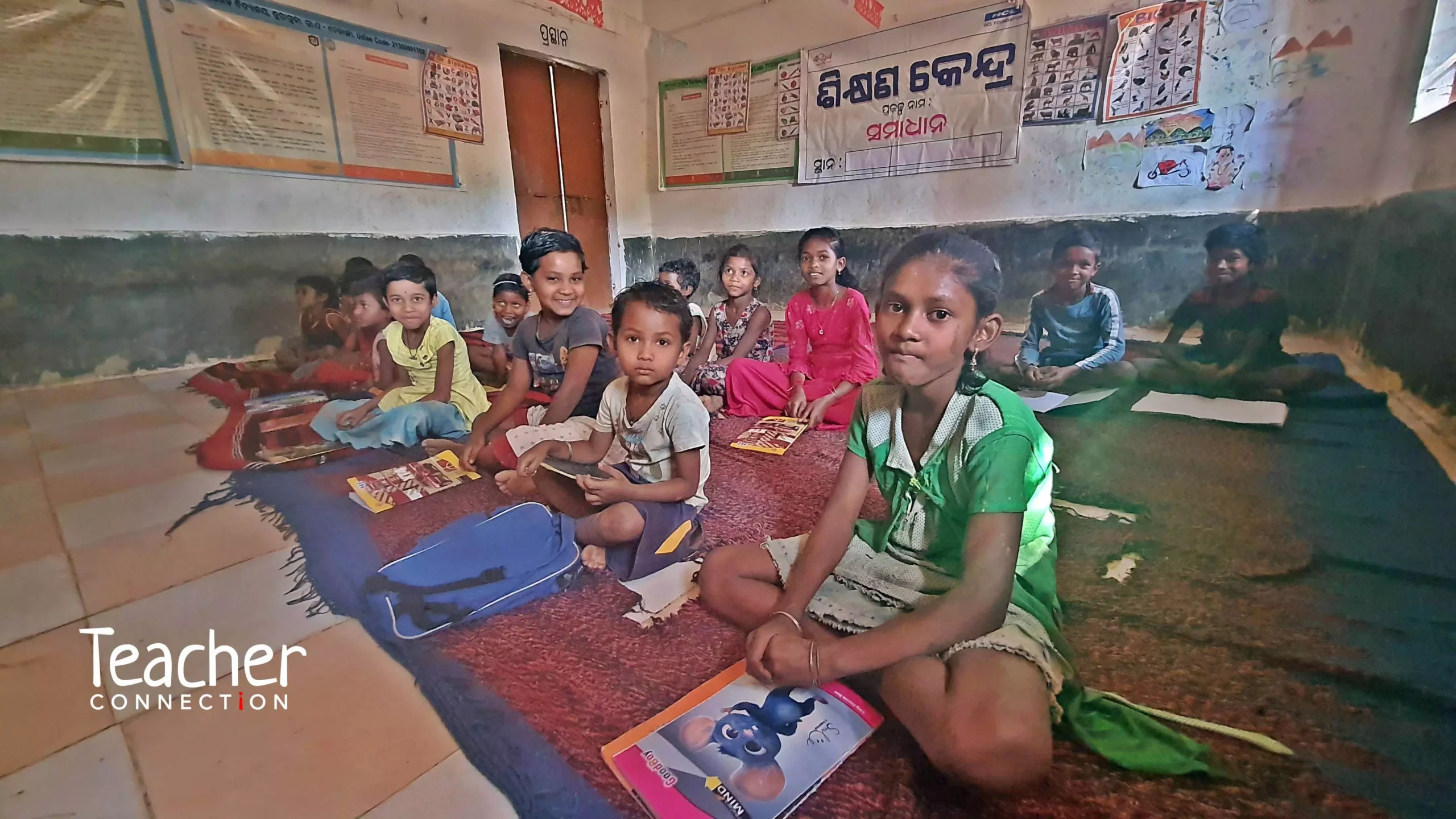
According to the 2011 Census, there are 63 million child migrants in India. The educational status of migrant children and the children of migrant labourers was already in a shambles, even before the outbreak of COVID-19.
Also Read: A teacher’s crusade to make sign language the 23rd official language of India
Educators were selected from the respective communities and designated as gaon mitras, meaning friends of the village, to visit rural households and encourage children to get back to studying. Geeta Pradhani was selected as a gaon mitra of the learning centre at Dhungiaput village.
“It took a few days of persuasion before Gupta reluctantly came to the learning centre. For the first week or so, I had to personally go and find him and bring him here,” Pradhani told Gaon Connection. But soon, he began to come there voluntarily, she smiled.
These learning centres are providing a second chance to drop-out kids to pursue education and bridge the learning gap left behind by the pandemic. There are about 1238 students in the 15 learning centres. These are not formal schools but centres run in community halls or anganwadi centres, or even at the homes of the Gaon Mitras. They give free coaching of regular courses and also compensate the learning loss incurred during the pandemic.
“I was afraid of going to school as I had forgotten all that I had learnt there. But, after attending classes at the centre for 15-20 days, I felt confident enough to return to school. I appeared for the annual examination in March this year and was promoted to Class nine,” said Gupta. “Now, I love studying and want to be a teacher and also pursue music,” he added. He said that he was grateful to Geeta Ma’am for taking interest in him and other children like him.
“There are several children like Gupta who worked as seasonal labourers and migrant labourers after the reverse migration of their parents during the COVID-induced lockdown,” Parshuram Pradhan, a social worker who has worked for development in Malkangiri, told Gaon Connection.
“Many children of the returning migrants were deprived of admission in schools as they did not have documents like birth certificates and ration cards. The gaon mitras helped them get their documents from the concerned authorities, and ensured the children were enrolled in schools,” said Parshuram Pradhan.
Also Read: It takes a village to raise and educate a child
In a shambles
According to the 2011 Census, there are 63 million child migrants in India. The educational status of migrant children and the children of migrant labourers was already in a shambles, even before the outbreak of COVID-19.
According to UNESCO Global Education Monitoring Report 2019, among young people who have grown up in a migrant rural household, 28 per cent were identified as illiterate or had an incomplete primary education. Up to 40 per cent of children from seasonal migrant households were likely to end up in work rather than at school, noted the report.
Malkangiri in Odisha is one of the educationally backward districts having a literacy rate of less than 50 per cent against the state rate of 72.87 per cent, as recorded in the Census 2011.
The COVID pandemic made it worse for the families of migrant workers as their children fell through the cracks and were finding it difficult to come back to the education stream.
A second chance
Sukanti Gouda of Dhungiaput could not get admission at the Government Upper Primary School as her parents, who worked as seasonal migrant labourers in Andhra Pradesh, failed to produce her birth certificate. Many of the inhabitants of this village seek jobs as construction labourers in the neighbouring state of Odisha. When they are back in the village, they are smallholder farmers who grow paddy, vegetables, millets and horsegram.
“Sukanti started coming to the learning centre with her friends to study. Seeing the seven-year-old’s interest in studies, we spoke to the village anganwadi worker and got her birth certificate. She was admitted in Class-1 in Dhungiaput Upper Primary School in October 2022,” said gaon mitra Geeta Pradhani.
When lockdown was imposed, Gopal Khudupia was studying in class two. But, when the schools reopened, he did not return.
“My husband is a seasonal migrant labourer and a small-holder farmer. I barter vegetables for rice, pulses and other necessary items door to door. Gopal helps both of us at work, and spends the rest of his time roaming around and playing with village boys,” Chanchala Sagaria, Gopal’s mother, told Gaon Connection.
But the efforts of gaon mitra Surendra Khudupia who is from Patraput village, saw Gopal returning to education. “Now Gopal regularly goes to the Patraput learning centre and never misses his school,” she said.
Also Read: A million dreams are taking shape in Karnataka’s rural libraries
According to Ananta Kishore Swain, an educationist based in Bhubaneswar, Samagra Siksha Abhiyaan has provisions like seasonal hostels/ residential camps in villages during migration periods, special residential/ non-residential training centres for dropout/ migrant children, besides provision of free mid-day meals, textbooks and uniforms to ensure elementary education of migrant children.
“The Right to Education (RTE) Act also has the mandate to ensure elementary education of migrant children. But, migrant children experience disruption in education and frequently drop out of schools. They also experience learning gaps due to migration and reverse migration which make it difficult for them to cope with the changed curriculum, place, instructors and friends,” Swain told Gaon Connection. These challenges worsened during and post pandemic situation, he added.
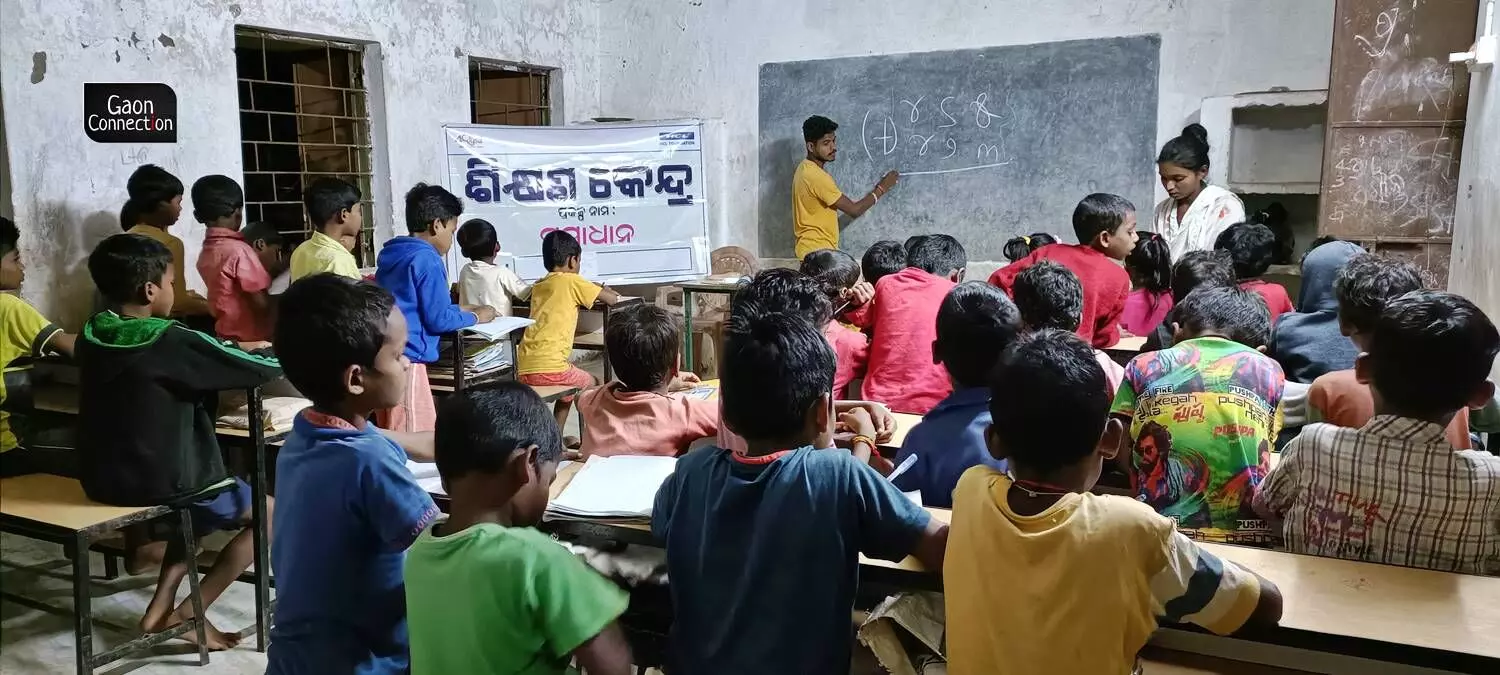
The COVID pandemic made it worse for the families of migrant workers as their children fell through the cracks and were finding it difficult to come back to the education stream.
It is the community-managed learning centres in the interiors of the Malkangiri district that have helped. “These centres were in line with the National Education Policy-2020 (Section 3.2) that proposes the states to bring in alternative and innovative education centres with civil society partnership to bring back the dropout children into mainstream education,” Basanta Kumar Nayak, a Bhubaneswar-based policy and budget analyst, told Gaon Connection.
The involvement of village-level volunteers, who closely observed the families belonging to their own communities, went a long way in identifying the migrant and dropout children and bringing them back to education, Nayak added.
According to Debjeet Beura, a volunteer, who advocates with the Mathili block administration for educational upliftment of tribal communities, many of the children were reluctant to go back to school as they had forgotten all that they had learnt. “The learning centres gave them the push to return them to studies, the remedial classes made them relearn the forgotten lessons and the end result that they were now confident to attend regular classes in schools,” said Beura.
“The learning centres, which were set up to compensate for the learning-loss due to school closure, should function eternally in tribal pockets as families are unable to afford paid tuition,” requested Ananda Pradhani, School Management Committee President of Baliguda Primary School in Malkangiri.
Pragati Prava is a Bhubaneswar-based journalist who writes on sustainability, conservation and indigenous communities.







